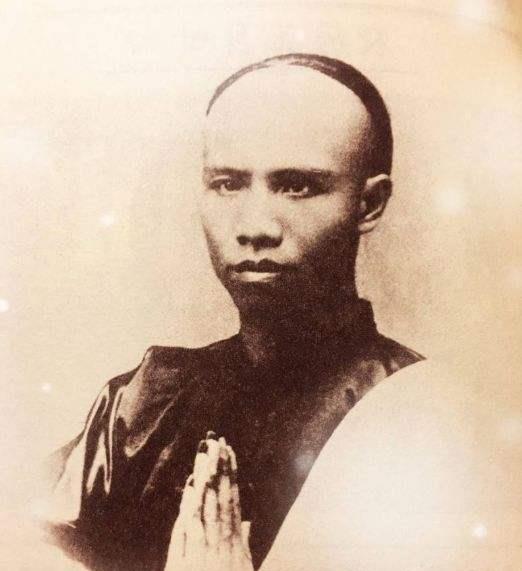"When I opened my eyes and found that I couldn't see anything, and when I saw a darkness in front of me, I was frightened by a nightmare, my whole body was terrified, and I was very sad, and that feeling made me unforgettable in this life..." This is a sentence in the classic helen's "If You Give Me Three Days of Light", it has nothing to do with Tan Sitong, but when I read it, I always think of Tan Sitong.
The change failed. Because of Yuan Shikai and Rong Lu's whistle-blowing, Cixi returned to the Forbidden City with lightning speed, scolded Guangxu bitterly, imprisoned Guangxu in Yingtai, and regained power herself. Subsequently, Cixi ordered the closure of beijing's city gates, blocked traffic, and dispatched 3,000 non-commissioned officers to search the city for the reformists. At this time, Tan Sitong was determined to become a dead soldier.

Liang Qichao's article "Tan Si Tong" said that he was in Tan Si Tong's apartment at the time, and they were sitting face to face, when suddenly came the news of searching Kang Youwei's residence and arresting Kang Youwei, tan Si Tong calmly said to him: "Before I wanted to save the emperor, I could not save it; now I want to save Mr. Kang, I can't save it, I have nothing to do, just wait for the time of death." He also said, "Even so, the world must know that it is difficult to do, but try to do it." Try visiting Hirobumi Ito at the Japanese Embassy in China and asking him to send a telegram to the Japanese consul in Shanghai to try to save Mr. Kang. ”
That night, Liang Qichao took refuge at the Japanese embassy, but Tan Sitong had been waiting at home for arrest, but the arrestees that night did not come. The next day Tan Si came to the Japanese embassy to meet with Liang Qichao and persuade Liang Qichao to go to Japan. Tan Sitong also brought with him several volumes of his writings and poems and some family letters, which he entrusted to Liang Qichao, saying: "There is no one who runs away, there is no way to seek the future; there is no martyr, there is no way to repay the monarch of the holy Ming." Now that Mr. Kang's life and death are not yet known, then Cheng Bao and Kitsune, Tsukishō and Saigo, let me and you play such roles. After that, he gently hugged Liang Qichao and said goodbye to him.
Still waiting for the arrestees to come, but the arrestees still did not come. In this way, Tan Sitong had three more days of freedom in his life, and during these three days, he tried to rescue the emperor, but he did not succeed; during these three days, japanese friends urged him to take refuge in Japan, but he not only did not accept it, but also said: "The changes in the countries of the world have not succeeded without bloodshed and sacrifice, and now China has not heard of those who have shed blood and sacrificed because of the change of law, which is the reason why China is not prosperous." If someone is to shed blood and sacrifice, please start with me Tan Si. ”
Three days later, Tan Sitong was arrested, and after he was imprisoned, he inscribed a poem on the wall of the prison: "Look at the door and stay with Zhang Jian, endure death and wait for Dugan." I smiled at the sky with a horizontal knife and went to leave the liver and gallbladder for two kunluns. All this was written by Liang Qichao in the article "Tan Si Tong".
On the way to the execution site, people are still extremely numb, no one cares about his death or death, and no one cares about the democratic ideas and dreams of the reformists. Some people even threw vegetables and eggs at Tan Sitong's face. Under the oppression and rule of the Qing government, these people had become accustomed to it, accustomed to the cold and cruel life of enslavement, and behaved indifferently to everything. Even so, I still didn't feel frustrated. Before the execution, the wife cried out in grief: "We don't have children yet!" Tan Sitong smiled slightly and said to his wife, "If a child is born but cannot see the light of this world, it is better not to come." The wife stopped crying when she heard this, but the tears became even more intense.
In ancient China, there was a kind of person who was called a dead soldier, and it is said that this kind of soldier was specially trained by the army to carry out assassination or assault missions, requiring one enemy and ten enemies, physical strength, and if the mission failed, generally did not live back. It seems that Tan Sitong gave a new definition to these two words, that is, death warns future generations, hoping that all living people can see the light.
According to folklore, when Tan Sitong was executed, the executioner, in order to make his death "uncomfortable", specially executed him with a blunt knife and cut more than 30 knives before succeeding. Liang Qichao said: "On that day, there were tens of thousands of people watching, and Tan Jun's generous demeanor did not change at all. That blunt knife extended Tan Sitong's life, as a "dead soldier", is more than 30 knives equivalent to dying more than 30 times? This warning is amazing!